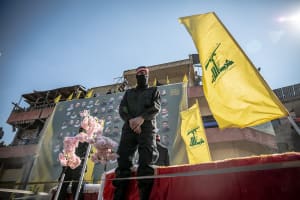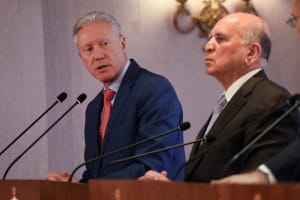Hezbollah slowly recovers despite Israeli airstrikes and pressure from Lebanese government
Lebanon summons Iranian ambassador for saying Hezbollah disarmament is a 'US conspiracy'

Despite constant Israeli airstrikes and a serious effort by the Lebanese government, the terror organization Hezbollah has managed to slowly recover from the months-long fighting that left it without its senior leadership and cut off from supplies from its Iranian patrons.
This past week, Israel has carried out near-daily airstrikes in Lebanon, showcasing the alertness of its intelligence network and the military's commitment to preventing any attempts to rebuild enemy strength.
However, they also showed that, despite significant losses, Hezbollah still poses a threat. “The reality is still in the making and one must act all the time not to let the monster grow again,” a senior military source told Ynet News.
The Iranians and Hezbollah have not abandoned their intentions to re-establish a foothold on Syrian soil. The motivation for this exists. In our assessment, this could be expressed in the near future through new cooperation with local forces based on various interests and… pic.twitter.com/BHybb4yYvW
— Israel-Alma (@Israel_Alma_org) April 17, 2025
He also conceded that the Lebanese Armed Forces (LAF) is operating effectively against Hezbollah in certain areas but added, “We will always want more.”
The security establishment reportedly identified attempts by Hezbollah to restore its chain of command, including a reorganization of the headquarters, regional commands, brigade and field commanders, all of which aim at preparing the ground to rebuild its devastated military capabilities.
To that end, the terror group is trying to reactivate its money smuggling efforts and find new routes to smuggle weapons from Iran.
According to Ynet, Israel Defense Forces has eliminated an average of one terrorist per day in Lebanon since the start of the ceasefire.
Sheikh Hussein Atwi, a very senior figure in Al-Jamaa Al-Islamiya - Al-Fajr Forces, was killed on the morning of April 22 in an airstrike while driving his car on Awarta road in the Haret Al-Naameh area, south of Beirut. Al-Fajr Forces operates in Lebanon as an organic framework… pic.twitter.com/VzGI5yqtCl
— Israel-Alma (@Israel_Alma_org) April 22, 2025
After an Israeli strike killed Sheikh Hussein Atwi, a senior member of the Sunni Al-Jama'a al-Islamiya organization near Beirut, the IDF announced that another strike on Tuesday targeted the Hezbollah commander responsible for the group’s Majdal Zoun compound.
Hezbollah later condemned the assassination of Atwi, demanding that “the Lebanese state bear its national responsibility and leave the position of a helpless spectator,” by taking “active and urgent steps on all levels and by all means.”
Despite the new Lebanese government showing the greatest efforts to combat Hezbollah in decades, it still criticized Israel for its strikes on Lebanese territory.
The Lebanese newspaper al-Joumhouria reported that President Joseph Aoun reached out to U.S. officials to discuss the “continued Israeli violations.”
Aoun reportedly made clear that the dialogue about disarming Hezbollah, which he has vowed would soon begin, would be impossible unless Israel fully adheres to the ceasefire agreement.
On Tuesday, Aoun received an indication of continued U.S. support from White House Envoy Morgan Ortagus, who is responsible for the Lebanon file. After a meeting with the Lebanese ambassador to the U.S., Ortagus affirmed that Aoun is determined to make “the bold and necessary decisions” for Lebanon's recovery.
“Lebanon is on the doorstep of a new phase,” she added. “If you decide to take this path, if you make the difficult decisions I always talk about in the media, I promise you that President Donald Trump, his administration, and the United States will be with you every step of the way, but we cannot go back.”
Meanwhile, tensions rose between the Lebanese government and the Iranian regime – another indication that Lebanon may be taking seriously the prospect of disarming Hezbollah and curbing its influence over the country.
Mojtaba Amani, Iran’s ambassador to Lebanon, who was injured in Operation Grim Beeper, discusses his wounds with irony. "Alhamdulillah, I was injured in the eye, hand, and face area, and I was relieved from having to bite 5 or 6 fingernails.” pic.twitter.com/cKX2EzMn1p
— Mike (@Doranimated) November 13, 2024
Lebanon’s Christian foreign minister, Youssef Raji, summoned the Iranian ambassador to Lebanon, Mojtaba Amani, to lodge an official protest, sources in the Foreign Ministry told the Saudi newspaper Asharq Al-Awsat.
Amani criticized the moves to disarm Hezbollah in a post on 𝕏, calling it a “U.S. conspiracy” aiming to weaken regional armies while benefiting the “Zionist entity,” meaning Israel.
In an interview on Tuesday, Amani struck a more conciliatory note in an interview with the al-Jadeed channel. Disarming Hezbollah is an internal Lebanese matter in which Iran does not interfere, Amani said, adding that Hezbollah is a legitimate party that has owned weapons for decades.
Amani was among thousands of Hezbollah and Iranian officials seriously wounded in the Israeli beeper explosion attack in September 2024.

The All Israel News Staff is a team of journalists in Israel.
You might also like to read this:
















